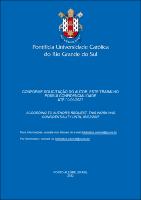| Share record |


|
Please use this identifier to cite or link to this item:
https://tede2.pucrs.br/tede2/handle/tede/10278| Document type: | Dissertação |
| Title: | A inclusão digital do paciente como instrumento de realização do direito à saúde no Brasil |
| Author: | Lovison, Willian  |
| Advisor: | Ruaro, Regina Linden |
| Abstract (native): | A inclusão digital no Brasil ainda não contempla uma parcela significativa de cidadãos. Os excluídos digitais não usufruem dos serviços públicos digitais, entre os quais se encontram aqueles relativos a prestações estatais no âmbito do direito à saúde, advindos de uma nomenclatura de governo nominado como Governo Digital. Frente esse panorama, a pesquisa desenvolvida tratou da interface entre inclusão digital, inovações tecnológicas na área da saúde e direito fundamental à saúde, calcando-se na investigação da seguinte problemática de pesquisa: a inclusão digital do paciente no Brasil é instrumento capaz de conferir a realização do direito à promoção e à proteção da saúde? Diante do movimento de digitalização da área da saúde no país, a Administração Pública deve primar pela busca da inclusão digital dos cidadãos (compreendida esta, no presente trabalho, como direito fundamental social), sejam dos que se encontram absolutamente excluídos digitalmente, sejam daqueles que (ainda) não são considerados incluídos digitalmente de forma efetiva. A inclusão digital efetiva do paciente brasileiro para a realização do direito fundamental à saúde reclama, para além da infraestrutura tecnológica, informação relevante e intermediação capacitadora do usuário, de uma inserção assentada na sua emancipação. Essa emancipação do paciente visa o seu empoderamento e a sua autonomia no processo terapêutico, despertando-o para participar ativamente do processo curativo e protetivo de sua saúde; a partir de uma concepção de governo de nomenclatura digital, inclusiva e, concomitantemente, não excludente, direcionada para a busca pela igualdade por meio de políticas públicas de inclusão digital. Ademais, a inclusão digital do paciente direcionada para o acesso ao seu prontuário eletrônico, além de ser propulsora de melhorias no campo da assistência em saúde do próprio paciente, permite que o inserido digital acompanhe e controle seus dados pessoais registrados de forma eletrônica, gerando uma maior confiabilidade por parte do paciente e tornando-o ainda mais engajado no processo terapêutico. Assim, a partir da pesquisa efetuada, constatou-se que a inclusão digital do paciente no Brasil é instrumento capaz de conferir a realização do direito à promoção e à proteção da saúde. |
| Abstract (english): | Digital inclusion in Brazil still does not cover a significant portion of citizens. The digitally excluded people do not benefit from digital public services, among which are those related to state services within the scope of the right to health, arising from a government nomenclature called Digital Government. Considering this scenery, the developed research dealt with the interface between digital inclusion, technological innovations in the health field and the fundamental right to health, based on the investigation of the following research problem: is digital inclusion of the patient in Brazil an instrument capable of conferring the achievement of the right to health promotion and protection? Considering the digitalization movement in the health field in the country, the Public Administration must strive for the digital inclusion of citizens (which is understood, in this study, as a fundamental social right), whether of those who are absolutely digitally excluded, or those who are (still) not considered effectively digitally included. The effective digital inclusion of the Brazilian patient for the achievement of the fundamental right to health demands, in addition to the technological infrastructure, relevant information and user-enabling intermediation, an insertion based on their emancipation. This emancipation of the patient aims at their empowerment and autonomy in the therapeutic process, preparing them to actively participate in the healing and protective process of their health; from a governamental concept of digital nomenclature, inclusive and, at the same time, non-excludable, directed to the search for equality through public policies of digital inclusion. In addition, the digital inclusion of the patient aiming at the access to electronic medical record, beyond being a tool for improvements in the field of patient health care, allows the digitally inserted to monitor and control their electronically recorded personal data, generating a greater reliability by the patient and making it even more engaged in the therapeutic process. Thus, from the research carried out, it was found that the digital inclusion of the patient in Brazil is an instrument capable of granting the achievement of the right to health promotion and protection. |
| Keywords: | Inclusão Digital Direito à Saúde Prontuário Eletrônico Dados Pessoais Governo Digital Digital Inclusion Right to Health Electronic Medical Record Personal Data Digital Government |
| CNPQ Knowledge Areas: | CIENCIAS SOCIAIS APLICADAS::DIREITO |
| Language: | por |
| Country: | Brasil |
| Publisher: | Pontifícia Universidade Católica do Rio Grande do Sul |
| Institution Acronym: | PUCRS |
| Department: | Escola de Direito |
| Program: | Programa de Pós-Graduação em Direito |
| Access type: | Acesso Aberto |
| Fulltext access restriction: | Trabalho será publicado como artigo ou livro |
| Time to release fulltext: | 60 meses |
| Date to release fulltext: | 02/06/2027 |
| URI: | https://tede2.pucrs.br/tede2/handle/tede/10278 |
| Issue Date: | 30-Mar-2022 |
| Appears in Collections: | Programa de Pós-Graduação em Direito |
Files in This Item:
| File | Description | Size | Format | |
|---|---|---|---|---|
| DIS_WILLIAN_LOVISON_CONFIDENCIAL.pdf | WILLIAN_LOVISON_DIS | 366.72 kB | Adobe PDF |  Download/Open Preview |
Items in DSpace are protected by copyright, with all rights reserved, unless otherwise indicated.




